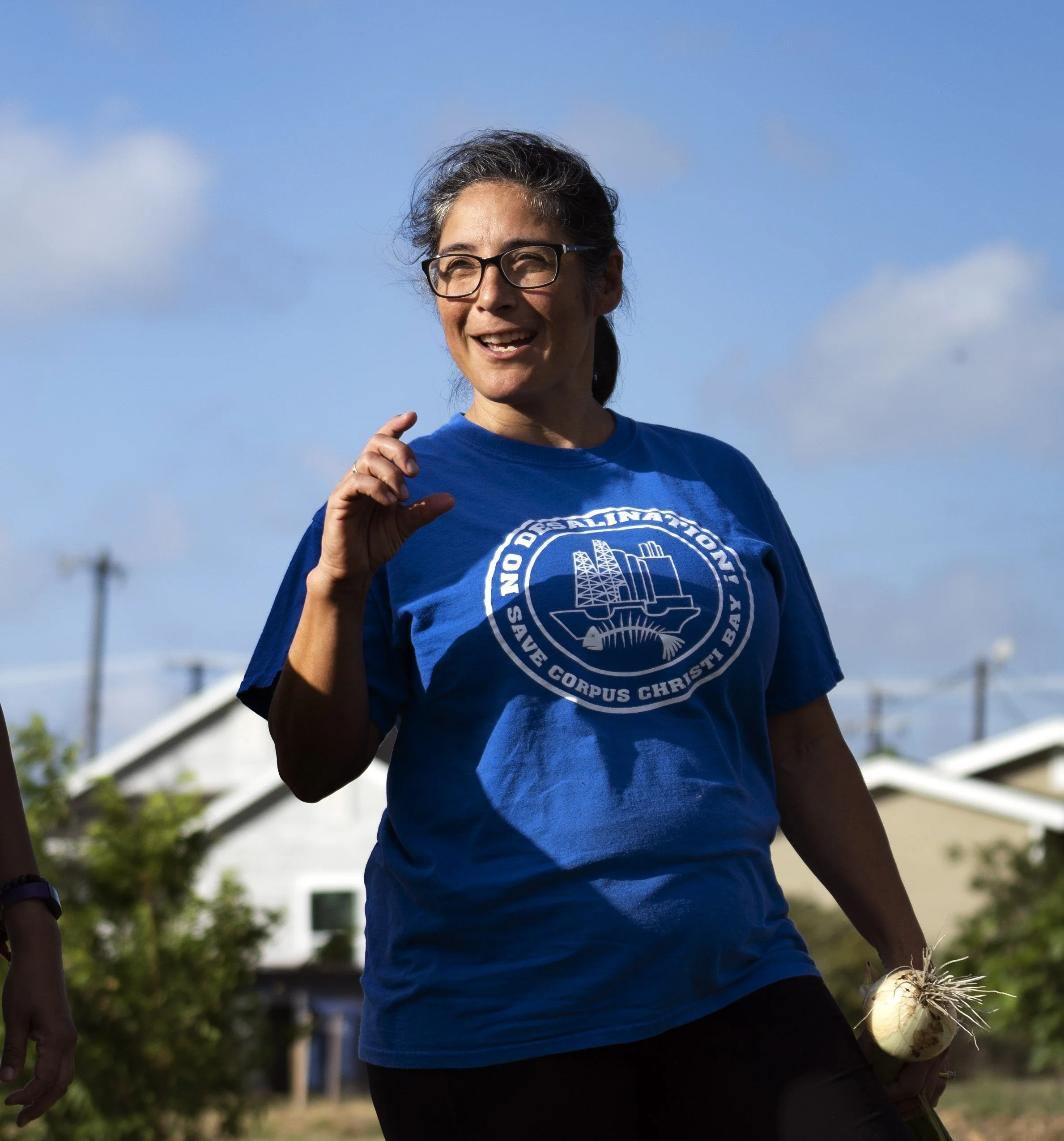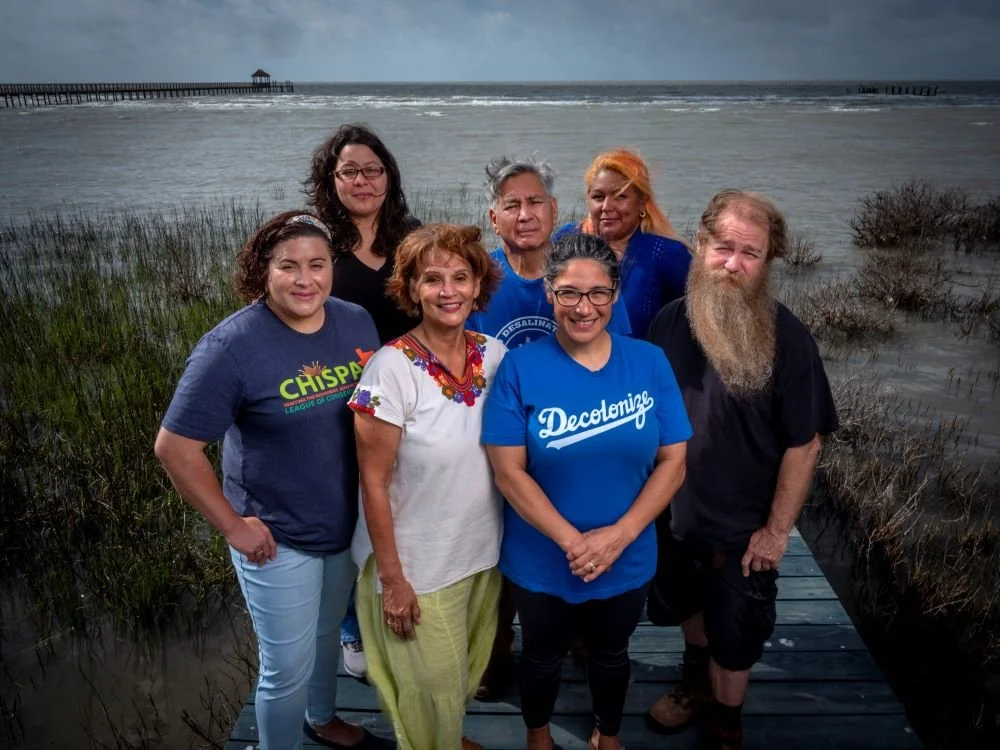Communities Challenge Industry Power on the Gulf Coast
This article was written as part of our 2023 Impact Report.
“If you look at the natural environment, this could be paradise,” said Isabel Araiza, a community leader and organizer in Corpus Christi, a Gulf Coast city Texans call their “sparking city by the sea.” “Sometimes I want to cry when I ride my bike in the morning. It's so pretty along the bay, but industry doesn't respect that.”
For the Greater Good co-founder Isabel Araiza. Photo by Jorge Sanhueza-Lyon.
That would be the oil and gas industry, whose refineries, export terminals, and petrochemical facilities line what was once a pristine coastline, dousing surrounding communities with pollution. The oil industry has been in Corpus Christi since the 1930s, but for decades industry was largely concentrated in a 10-mile “refinery row” beside the port. In the last few years, however, fueled by the fracking boom, Corpus and neighboring towns are fast becoming a petro-region. First it was a plastics plant owned by Occidental and Mexichem; then it was Chenier’s liquified natural gas (LNG) export facility; then new crude oil and export facilities built by Koch Industries and Moda Midstream; and many more facilities proposed.
This massive buildout has been actively promoted by local governments, the Port of Corpus Christi, and the Texas Commission on Environmental Quality, who have been rubberstamping permits, providing tax breaks, and building infrastructure to support it. If allowed to continue expanding, these industries will lock in more climate pollution for decades to come, and further devastate local communities’ health and coastal livelihoods.
A Different Vision
“The industry reps, they come over in our area and they say, ‘we want to be good neighbors.’ They throw money to different organizations, thinking that's all they need to do. And then they are not truthful with you, they are not telling you, ‘we're poisoning your environment, we're consuming all your water, and we can file bankruptcy any time and leave you to clean up the mess,’” explained Elida Castillo, Program Director for Corpus-based Latinx civic engagement group Chispa Texas.
Castillo, Araiza, and other Black, Brown, and Indigenous leaders that are rising up to fight this growing threat have a different vision for their communities. “We deserve to have clean water and clean air, to be treated with dignity,” said Araiza, “and we want to build a community and a way of governance that recognizes the value of all people.”
Over the last several years, they have been doing just that, using organizing, education, and advocacy to chip away at industries’ stranglehold on local politics and local imaginations, and demand that their government start to work for the people.
Water for People, Not Industry
Access to clean water has emerged as a powerful organizing principle. In 2015, the city of Corpus Christi started issuing periodic water boil notices for everything from burst pipes to bacteria to chemical contaminants from industry. “The city wasn't taking care of its water infrastructure,” explained Araiza. “And then when they failed to do their jobs, the burden was placed on people to try to come up with potable water.”
Araiza, then an Associate Professor of Sociology at Texas A&M University-Corpus Christi, co-founded a mutual aid group called For the Greater Good to help community members access drinking water. Indigenous Peoples of the Coastal Bend, an intertribal organization representing five tribes in the region, was born in the same way. But their work quickly became about more than just mutual aid.
When new oil, gas, and petrochemical plants started moving in, the water issues worsened. Just one of these plants—a new facility being developed by ExxonMobil and a Saudi company to process fracking byproducts into plastics and other chemicals—was going to need 20 million gallons of fresh water a day for its operations, enough to meet the needs of 120,000 residents. The city — which manages water for 500,000 people in a 12-county region — and the Port assured their industry partners that they’d be able to meet the demand despite an on-going drought, initiating plans to build five water desalination plants, even as they imposed strict water conservation measures on the local populace.
Protest outside Corpus Christi city hall in 2016 following a water ban. Courtesy of For the Greater Good.
Opposition to these desalination plants, whose salty effluent would devastate the delicate bay ecosystem and destroy what was left of the region’s shrimping and fishing industries, brought together groups from up and down the coast — For the Greater Good, Indigenous Peoples of the Coastal Bend, Chispa Texas, South Texas Human Rights Center, and other community groups, along with a handful of bigger statewide organizations like Texas Campaign for the Environment — that until now had been working in relative isolation.
“We saw desalination as a potential choke spot for the industrial build out,” said Araiza. “If a desalination plant gets built, then there's really no stopping industry.”
Supporting Powerful Coalitions
There was only one problem: Most of these groups were tiny, either barely staffed or all-volunteer, and had limited capacity to engage on equal footing with larger, more established groups in the kind of coordinated campaign that was going to be needed to take on industrial expansion at scale. The Hive Fund, recognizing the critical importance of the cultural and community-rooted organizing power these groups brought, offered them multiyear general operating grants that allowed them to both build out their own strategies and collaborate with others as full partners.
Community leaders, including Isabel Araiza (front, second from right), Elida Castillo (front, left), and Love Sanchez, Co-Founder of Indigenous Peoples of the Coastal Bend (back, right) came together to fight planned desalination plants. Photo by Jorge Sanhueza-Lyon.
“It’s really great when we have so many groups working on different issues and having different strengths be able to come together and say, ‘I’ll take that on,’” said Chispa’s Elida Castillo. “There are still growing pains, and we are still learning and building relationships, but what we have been able to accomplish in two years together is really exciting.”
Their collaboration has proved powerful indeed. By rallying community members to appear and provide comments at public hearings and council meetings; organizing visits to the region for Environmental Protection Agency staff; contesting permits; filing civil rights lawsuits; and generating local, state, and national media coverage, including a feature in Rolling Stones Magazine, the groups have successfully stalled all five desalination projects. In addition, the EPA denied Cheniere LNG’s request for an exemption to use a toxic turbine, and withdrew the pollution control permit for Bluewater’s planned offshore oil export terminal.
Shifting Local Power
But the real wins went far beyond these facility victories. The organizing and education work done door-to-door, at farmers’ markets, and at community events, has begun to change the public’s understanding of industry and how it impacts their lives, their communities, and their beautiful bay. In November of 2022, Corpus Christi residents replaced two of members of their city council — a body that has a huge amount of decision-making power around industry — with community activists who ran on as part of a “Clean Slate” platform. Around the same time, the Ingleside school district denied a key tax break to Enbridge, a company Indigenous Peoples of the Coastal Bend had been fighting for years over its destruction of their ancestral lands and artifacts. And in May, 2023, the CEO of the Port of Corpus Christi, a major champion of industrial growth, was forced to resign after groups got media coverage of his exorbitant entertainment expenses.
“The community sees the work we’ve been able to accomplish, and the port, the city council, and industry see us a powerhouse,” said Castillo. “Now whenever we do something, we see a response.”
Carbon emissions from the massive growth of US oil and gas industries — centered in communities like these — could dwarf all the reductions promised by clean energy deployment through the Inflation Reduction Act, making it impossible for the US to meet its climate goals. Frontline groups, not just in Corpus but all along the Gulf Coast region, are working to not just keep these dirty industries out of their backyards, but also to shift hearts and minds and build power for long-term transformation of our energy systems.
“It takes so much time and work to create the vision of the future that we want to see, where we are working in reciprocal relationships with our environment,” said Dorothy Peña, who does community education and outreach with Indigenous Peoples of the Coastal Bend. “People have to see that, and see how it works, and make the long-term investment.”
Trusting that process, and giving community groups the support they need to both do the on-the-ground work with their communities and join together in powerful coalitions, will be key to taking power back from industry so we can finally make the climate progress we need.



